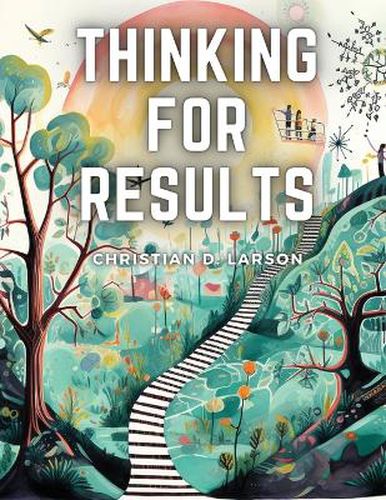Readings Newsletter
Become a Readings Member to make your shopping experience even easier.
Sign in or sign up for free!
You’re not far away from qualifying for FREE standard shipping within Australia
You’ve qualified for FREE standard shipping within Australia
The cart is loading…






This title is printed to order. This book may have been self-published. If so, we cannot guarantee the quality of the content. In the main most books will have gone through the editing process however some may not. We therefore suggest that you be aware of this before ordering this book. If in doubt check either the author or publisher’s details as we are unable to accept any returns unless they are faulty. Please contact us if you have any questions.
Thinking For Results is a book by American New Thought leader Christian D. Larson, first published in 1912. It is a short self-help book that encourages you to change your way of thinking in order to become more successful in life.
Larson discusses various ways in which to do this, how people should keep a positive mind, have end goals in sight, live in accordance with natural laws, and accept that mental conceptions will improve with greater concentration on the good things in one's life.
Man is as he thinks he is, and what he does is the result of the sum total of his thought. The average person, however, thinks at random and therefore lives at random and does not know from day to day whether good or evil lies in his path.
What he finds in his path is invariably the result of his own thinking, but as he does not know what results different kinds of thought produce he creates both good and evil daily not knowing that he necessarily does either of these.
When he knows what each mental state will produce, however, and has gained the power to think as he likes under all sorts of circumstances, then he will have fate, destiny, environment, physical conditions, mental conditions, attainments, achievements and in fact everything in his own hands. You never think scientifically unless you think for a purpose; it is therefore purposeless thinking that you must avoid.
To train the mind to think only in the right states of mind we must learn to distinguish between right and wrong mental states, though this is a matter that becomes very simple when we understand that the difference between right and wrong states of mind is found in this, that the former tends to relate the mind properly to the laws, the principles and the powers of life, while the latter tends to prevent that relationship.
$9.00 standard shipping within Australia
FREE standard shipping within Australia for orders over $100.00
Express & International shipping calculated at checkout
This title is printed to order. This book may have been self-published. If so, we cannot guarantee the quality of the content. In the main most books will have gone through the editing process however some may not. We therefore suggest that you be aware of this before ordering this book. If in doubt check either the author or publisher’s details as we are unable to accept any returns unless they are faulty. Please contact us if you have any questions.
Thinking For Results is a book by American New Thought leader Christian D. Larson, first published in 1912. It is a short self-help book that encourages you to change your way of thinking in order to become more successful in life.
Larson discusses various ways in which to do this, how people should keep a positive mind, have end goals in sight, live in accordance with natural laws, and accept that mental conceptions will improve with greater concentration on the good things in one's life.
Man is as he thinks he is, and what he does is the result of the sum total of his thought. The average person, however, thinks at random and therefore lives at random and does not know from day to day whether good or evil lies in his path.
What he finds in his path is invariably the result of his own thinking, but as he does not know what results different kinds of thought produce he creates both good and evil daily not knowing that he necessarily does either of these.
When he knows what each mental state will produce, however, and has gained the power to think as he likes under all sorts of circumstances, then he will have fate, destiny, environment, physical conditions, mental conditions, attainments, achievements and in fact everything in his own hands. You never think scientifically unless you think for a purpose; it is therefore purposeless thinking that you must avoid.
To train the mind to think only in the right states of mind we must learn to distinguish between right and wrong mental states, though this is a matter that becomes very simple when we understand that the difference between right and wrong states of mind is found in this, that the former tends to relate the mind properly to the laws, the principles and the powers of life, while the latter tends to prevent that relationship.